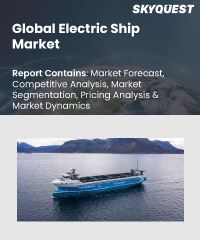
Product ID: SQMIG20T2012

Report ID:
SQMIG20T2012 |
Region:
Global |
Published Date: March, 2024
Pages:
202
|
Tables:
64 |
Figures:
75
Global Electric ship market size was valued at USD 4.00 billion in 2022 and is poised to grow from USD 4.36 billion in 2023 to USD 8.69 billion by 2030, at a CAGR of 6.0% during the forecast period (2024-2031).
The global electric ship market is experiencing significant growth due to increasing environmental concerns and regulatory pressures to reduce emissions from maritime transportation.
Electric ships offer a cleaner and more sustainable alternative to traditional fuel-powered vessels, with benefits including lower greenhouse gas emissions, reduced operating costs, and enhanced efficiency.
Advancements in battery technology and charging infrastructure are driving adoption. However, challenges such as limited range and initial investment costs remain.
Overall, the electric ship market shows promise for reshaping the maritime industry towards a more eco-friendly and efficient future.
US Electric Ship Market is poised to grow at a sustainable CAGR for the next forecast year.
Our industry expert will work with you to provide you with customized data in a short amount of time.
REQUEST FREE CUSTOMIZATIONWant to customize this report? This report can be personalized according to your needs. Our analysts and industry experts will work directly with you to understand your requirements and provide you with customized data in a short amount of time. We offer $1000 worth of FREE customization at the time of purchase.

Product ID: SQMIG20T2012